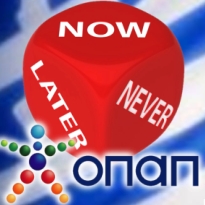 Greek sports betting and lottery monopoly provider OPAP SA reported a 21% drop in Q4 2011 profit, due in part to poor performance of its Kino numbers game. Net income in Q4 was €128.3m, compared to €162.7m the previous year. Revenues were down 7.9% to €1.16b. Kino revenues fell 8.2% to €599.4m while fixed-odds betting offering Pame Stihima was off 15% to €421.9m. Profit for the full year was €537.5m, down 6.7% from 2010.
Greek sports betting and lottery monopoly provider OPAP SA reported a 21% drop in Q4 2011 profit, due in part to poor performance of its Kino numbers game. Net income in Q4 was €128.3m, compared to €162.7m the previous year. Revenues were down 7.9% to €1.16b. Kino revenues fell 8.2% to €599.4m while fixed-odds betting offering Pame Stihima was off 15% to €421.9m. Profit for the full year was €537.5m, down 6.7% from 2010.
Stop us if you’ve heard this one before, but the cash-strapped Greek government is once again vowing to sell off a 29% stake in OPAP to satisfy the demands of the European Union and International Monetary Fund, whose bailout bucks are the only think keeping Greece from hawking pencils from a tin cup at the United Nations. The country’s chief privatization official Costas Mitropoulos told Reuters the latest OPAP sale would begin before the country holds national elections in May and will conclude before the year is done. Previous attempts at flogging OPAP were scuttled because the economic conditions had devalued the betting giant’s market value. Unlike now, because… er, little help, Costas? “If elections go well, if there is a government and a clear direction, then the perceived country risk for investors will fall to levels that will allow investment.” If ifs and buts were candy and nuts…
Similar delays have also hit the proposed privatization of ODIE, the Hellenic Horse Racing Co. (and not just due to the recent arrest of CEO Alexandros Zaharis on tax-evasion charges). Earlier this month, another state privatization official (apparently the only growth industry in Greece) said the sale had been put off until April, ostensibly to allow a restructuring of the business to make ODIE a more tempting acquisition. (Greece did a similar overhaul of OPAP last year by extending its monopoly another 10 years and granting it a mammoth concession on video lottery terminals.) There are concerns that such enhancements, in combination with ODIE’s preferential tax status, might raise state-aid issues with European Commission watchdogs. Of course, this is all based on the assumption that Greece’s ‘market conditions’ will downgrade from ‘hellish’ to ‘slightly hellish with a chance of locusts’. Fingers crossed.





